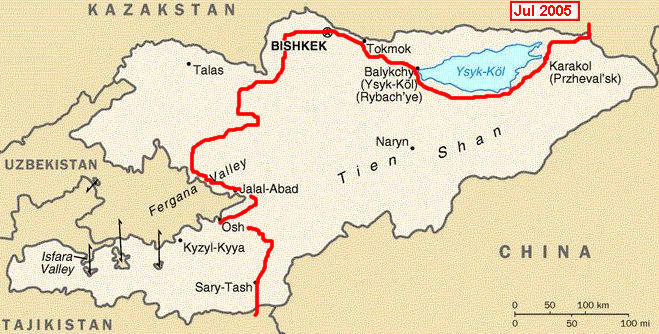
This is part of the eleventh section of my around the
world trip.
Complete Trip Overview & Map
Coming from Kazakhstan

19/7/05 Kyrgyzstan border also easy and efficient. A customs declaration, immigration stamp, and the out and in crossing about 30 minutes in total. The cold evening was setting in and just a couple of km's from the border I took a track to pastures above a stream overlooking a small town to camp. The meadows lush green, the stockmen out moving horses, cattle, sheep and goats to their night time camps. One passed by the tent, youngish, asked first for money, bread, cigarettes. A smile and polite refusal seemed to satisfy the half hearted try. I don't mind giving things for services but don't like building expectations of gifts from foreigners.
20/7/05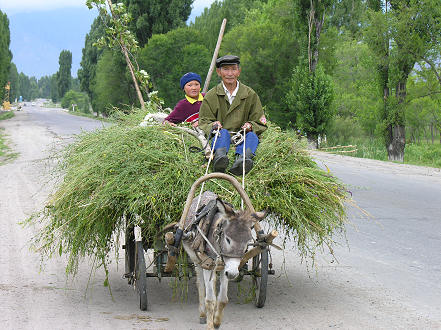 A cool beautiful morning awakened by the stockmen moving more animals
to higher ground. Another visit, an older gentleman, interested in my camp.
An invite to tea at his place, refused, and a counter invite for him to
join me, also refused. A more dignified encounter. Kyrgyzstan has been
reported to me by other tourists as their favourite country in the region.
Kazakhstan has directed its interests towards its oil reserves and Kyrgyzstan
towards tourism. An environmental tax of $US 12.00 and a couple of children
on the road throwing stones at the motorcycle as I passed not a great start.
Only in Pakistan's hills have I encountered kids throwing stones at me
before. Now like then I chased them, by motorcycle, made a bit of a scene
in the village, and watched the children flight up a hill to safety, exhausted,
a fair punishment. To do nothing would show tacit tolerance. In pakistan
it was a big problem, particularly for bicyclists, often dressed inappropriately.
I had a slow ride to Karakol admiring the scenery, the varied donkey carts,
outnumbering cars along this road, the beekeepers with their hives dotting
the hillsides and the variety of hats worn by locals.
A cool beautiful morning awakened by the stockmen moving more animals
to higher ground. Another visit, an older gentleman, interested in my camp.
An invite to tea at his place, refused, and a counter invite for him to
join me, also refused. A more dignified encounter. Kyrgyzstan has been
reported to me by other tourists as their favourite country in the region.
Kazakhstan has directed its interests towards its oil reserves and Kyrgyzstan
towards tourism. An environmental tax of $US 12.00 and a couple of children
on the road throwing stones at the motorcycle as I passed not a great start.
Only in Pakistan's hills have I encountered kids throwing stones at me
before. Now like then I chased them, by motorcycle, made a bit of a scene
in the village, and watched the children flight up a hill to safety, exhausted,
a fair punishment. To do nothing would show tacit tolerance. In pakistan
it was a big problem, particularly for bicyclists, often dressed inappropriately.
I had a slow ride to Karakol admiring the scenery, the varied donkey carts,
outnumbering cars along this road, the beekeepers with their hives dotting
the hillsides and the variety of hats worn by locals.
21/7/05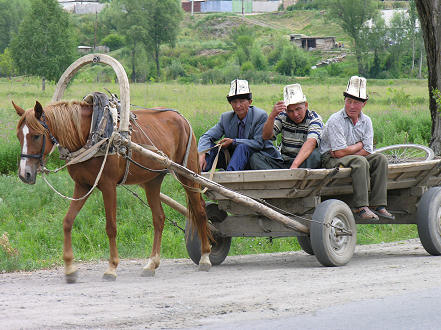 I start each meeting here with the right hand over the heart and
the word "tourist", seemingly recognized by everyone. This immediately
explains a number of things. Why I look and act differently, why I can't
speak the language and I will need assistance. Whether it is buying groceries,
petrol, food in a restaurant or asking directions it immediately puts the
other person more at ease. Often I add that I am an Australian, as I am usually
perceived as an American, the reaction is always positive. Today headed
up in the Valley of Flowers, a short day trip. Even though this valley
receives numerous tourists the locals remain friendly. I was invited into
a yurt, round felt house of the nomad, for fermented mare's (horse) milk
and bread, escorted through the valley by a young man and washed the motorcycle
in a stream watched by two Belgian treckers having a lunch break.
I start each meeting here with the right hand over the heart and
the word "tourist", seemingly recognized by everyone. This immediately
explains a number of things. Why I look and act differently, why I can't
speak the language and I will need assistance. Whether it is buying groceries,
petrol, food in a restaurant or asking directions it immediately puts the
other person more at ease. Often I add that I am an Australian, as I am usually
perceived as an American, the reaction is always positive. Today headed
up in the Valley of Flowers, a short day trip. Even though this valley
receives numerous tourists the locals remain friendly. I was invited into
a yurt, round felt house of the nomad, for fermented mare's (horse) milk
and bread, escorted through the valley by a young man and washed the motorcycle
in a stream watched by two Belgian treckers having a lunch break.
22/7/05 A day at the hostel, chatting and odd jobs. It rained most of the time.
23/7/05 The hostel teemed me up with a discounted trip
to Altyn Arashan as an extra to a couple of Swedish UN workers who were
receiving preferential treatment, which I also enjoyed.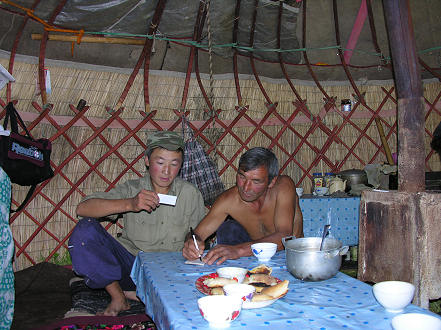 The two hour ride in a Russian jeep over an unbelievably rough road
had us above 3000 metres in a magnificent alpine valley of summer pasture,
grazing animals, yurts and hot springs. Lunch with beer and spirits,
hot tub, horse ride and watching evening settle had me left behind as
everyone else departed, other than the local girl who looks after the
place, and my meals. I had a solid winter cabin to myself, in candle light,
for the night.
The two hour ride in a Russian jeep over an unbelievably rough road
had us above 3000 metres in a magnificent alpine valley of summer pasture,
grazing animals, yurts and hot springs. Lunch with beer and spirits,
hot tub, horse ride and watching evening settle had me left behind as
everyone else departed, other than the local girl who looks after the
place, and my meals. I had a solid winter cabin to myself, in candle light,
for the night.
24/7/05 Horse rental is less than $US 2.00 per hour and
Tanya, the local girl, and I took the mountain trail, steeply upwards,
over a river, across meadows, alongside snow melt streams, into more lush
pastures of wildflowers to the head of the valley at about 3500 metres.
The two dogs accompanying us chased marmots, running from one burrow to
the next as the large fury animals barked out a warning to its mates before
dashing into its burrow. We rode the horses uphill, walked them down hills,
lay in the long grass as the horses grazed and we all rested. Five hours
later we were back at camp where a few other tourists had just arrived and
I caught the jeep back to Karakol for the evening.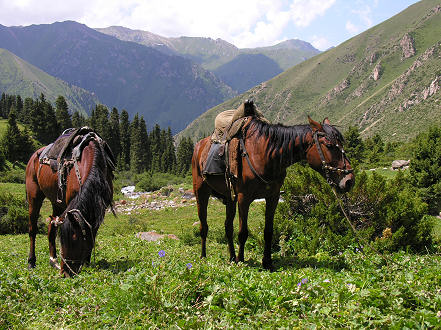
25/7/05 There are a couple of routes from here to the south. The north or south side of Lake Issyk Kul then the bad mountain road to Jalal Abad or the road through Bishkek. The lakes northern shore is more developed with local tourism, the south more remote, both sides are fringed with snow capped mountains. I headed along the southern shore, just 115 km to Kaji Say, a bit of a holiday town, tourists from Bishkek with their families occupy the beach front cabins whilst I and two other travellers stayed in a nice homestay set amongst an orchard of cherry, apricot, and apple trees. The cherries and apricots ready to eat making a great accompaniment to the local dishes prepared by our host.
26/7/05 Even though the lakes waters are cold on this
warm summers day people were briefly swimming, most like me were just
lazing on the coarse sand beach. The Swiss and German couple and myself
moved just five km after lunch to a yurt camp for the night. Set up for
tourists, back from the road and lake, they provide traditional meals and
a mattress on the floor,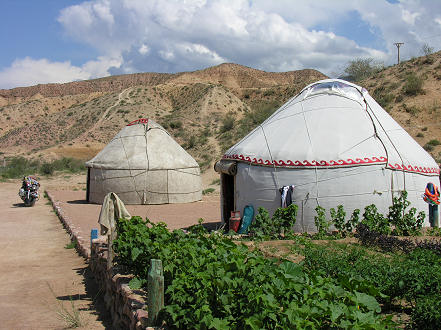 one yurt for myself, another for the other couple. Greenpepers stuffed
with rice and meat along with a vegetable soup, dried apricots and raspberry
jam for the fresh bread, all local produce. My restful night was unfortunately
disturbed by a few long walks to the squat outdoor toilet as I had developed
a stomach bug from somewhere that was now rumbling my insides.
one yurt for myself, another for the other couple. Greenpepers stuffed
with rice and meat along with a vegetable soup, dried apricots and raspberry
jam for the fresh bread, all local produce. My restful night was unfortunately
disturbed by a few long walks to the squat outdoor toilet as I had developed
a stomach bug from somewhere that was now rumbling my insides.
27/7/05 Bishkek is a Soviet city from the past. Spread out with statues in the large parks and parade grounds. Back to the Babushkas who ignore you at the hotel and the boy in the parking lot who tries to double prices. The city has its appeal with tree lined streets but only holds me for the day.
28/7/05 Heading west I am soon at the mountains. Two
passes at over 3000 metres, one with a tunnel in the top. Joined by a plateau
of summer grazing there are dozens of yurt roadside selling a variety of
animal milks and creams with bread and tea, also honey at lower altitudes.
I tried a different fermented mares milk, sold from a dried goat skin with
legs tied into a bag. It tasted rancid, salty and sour all at the same time
and was as much as I could do to drink it.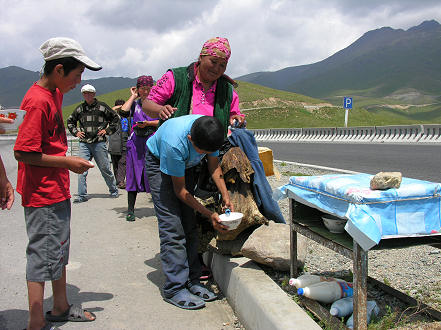 Another place served me cream and bread, refusing payment, great hospitality.
The further south and west I head the more Muslim the population becomes.
The last few mornings I have been awakened by the call to prayer, new
mosques replacing new churches on the skyline, after years of non religion
of the Russian era. The felt hat is being replaced by the Muslim white
or black hat and a few head scarves are starting to appear.
Another place served me cream and bread, refusing payment, great hospitality.
The further south and west I head the more Muslim the population becomes.
The last few mornings I have been awakened by the call to prayer, new
mosques replacing new churches on the skyline, after years of non religion
of the Russian era. The felt hat is being replaced by the Muslim white
or black hat and a few head scarves are starting to appear.
29/7/05 Again a great ride. It is 650 km from Bishkek
to Osh and 500 km of that is excellent road, one of the worlds best rides
in my opinion. Little traffic and magnificent scenery. The only complaint
being the flat corners. All of the Eastern Block countries don't camber corners
leading to a slower ride, and more dangerous, than is necessary. Barren
mountains, a turquoise lake and river finally had me back on the hot pasture
lands. Guaranteed water each year from the snow melt irrigation of sunflowers,
corn, cotton and other crops thrive. To be able to measure the depth of
snow and know how much irrigation water will be available in summer must
be a great advantage before sowing crops. I was 60 km from Osh and arrived
at the Uzbekistan border.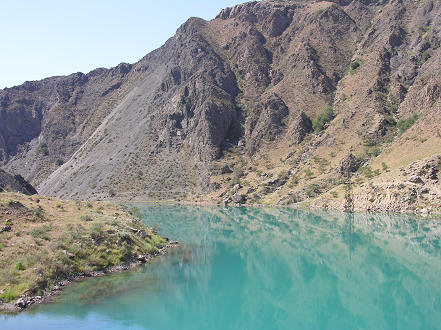 Before Russian occupation of the land here no countries existed, just
moving territories along clan lines. Stalin created the five countries
just drawing lines on the map, built enclaves in neighbouring lands and
put in road and rail links oblivious to borders. So when real countries
were formed in the 1990's the only way to get to different parts of your
own country was to travel through its neighbour. Since then new roads are
being built around enclaves and neighbours hence my 60 km's to Osh now became
100 km along an under construction new road, as I, like most people here,
didn't have a Uzbekistan visa to be able to use the old shorter road.
Before Russian occupation of the land here no countries existed, just
moving territories along clan lines. Stalin created the five countries
just drawing lines on the map, built enclaves in neighbouring lands and
put in road and rail links oblivious to borders. So when real countries
were formed in the 1990's the only way to get to different parts of your
own country was to travel through its neighbour. Since then new roads are
being built around enclaves and neighbours hence my 60 km's to Osh now became
100 km along an under construction new road, as I, like most people here,
didn't have a Uzbekistan visa to be able to use the old shorter road.
30/7/05 Osh, despite its Soviet recent history seems to
have kept the appeal of its ethnic blend of peoples and foods. Kyrgyzstans
second biggest city and 40% ethnic Uzbekistan citizens, others of Asian,
Indian and Iranian appearance add to its charm. There are few Russians here
and the culture of paying first at petrol stations and in small restaurants
has disappeared. There is more trust and my motorcycle sits outside the apartment
block all night without being disturbed.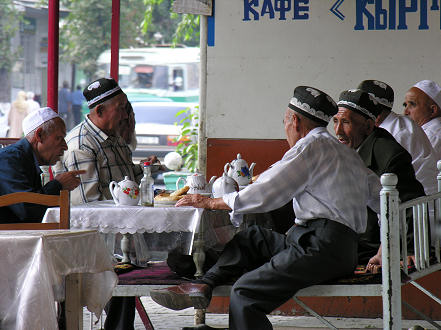 Food is more reminiscent of countries to the south, potatoes and meat,
the left hand is not often used and I am the only one eating alone in restaurants,
others are with friends, relatives or family. I am often asked with a quizzical
look, you are travelling alone? Two more bicyclists were at the hostel,
having just come across the Pamir Highway in Tajikistan, they were a great
source of information on this remote region.
Food is more reminiscent of countries to the south, potatoes and meat,
the left hand is not often used and I am the only one eating alone in restaurants,
others are with friends, relatives or family. I am often asked with a quizzical
look, you are travelling alone? Two more bicyclists were at the hostel,
having just come across the Pamir Highway in Tajikistan, they were a great
source of information on this remote region.
31/7/05 The Pamir Highway officially runs from Osh to Khorog,
a distance of 750 km, over three 4000 metre plus passes, one at 4655 metres.
Built by the Russians in the 1930's to protect the region from possible invasion
it runs next to China and Afghanistan. It has suffered recently from a lack
of maintenance and the continuation of the road onto Dushanbe, Tajikistans
capital, is almost non existent. Breakfasted again in the local restaurant
where the same menu is served at 8 am or 8 pm or at any other time, where
you don't bite down too hard on the food for fear of breaking a tooth on
a bone fragment, where knives are non existent and people sit on a raised
platform around a low table. I started out from Osh joined by many scrap
metal trucks heading for China.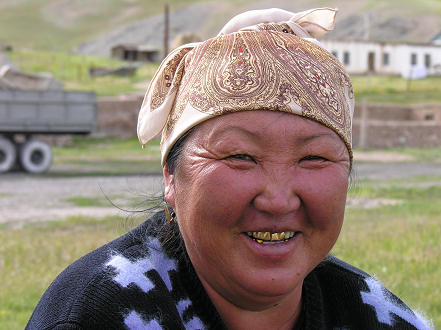 I have been encountering China's high demand for scrap metal from all
over South East Asia as I have been skirting the country. It is having a
great impact in cleaning up metal rubbish in many countries. The once asphalt
road, now a mixture of potholes, disintegrated by the trucks, and without
maintenance is set to deteriorate further, passes through lovely green
mountain pastures where the scythe is still used to collect winters stock
feed, small haystacks dot the slopes while yurts dot the valleys near rivers.
The 3600 metre pass drops down into Sary Tash with its snowy mountain view.
People here are cleaning out their sod roofed stables, collecting last
winters sheep dung, drying it, and will use it for cooking and heating next
winter. Meanwhile the animals are out grazing the mountains nearby. A small
frontier border town, petrol sold from drums and only local currencies changed
and at dreadful rates, thankfully I had obtained Tajik Somoni in Osh.
I have been encountering China's high demand for scrap metal from all
over South East Asia as I have been skirting the country. It is having a
great impact in cleaning up metal rubbish in many countries. The once asphalt
road, now a mixture of potholes, disintegrated by the trucks, and without
maintenance is set to deteriorate further, passes through lovely green
mountain pastures where the scythe is still used to collect winters stock
feed, small haystacks dot the slopes while yurts dot the valleys near rivers.
The 3600 metre pass drops down into Sary Tash with its snowy mountain view.
People here are cleaning out their sod roofed stables, collecting last
winters sheep dung, drying it, and will use it for cooking and heating next
winter. Meanwhile the animals are out grazing the mountains nearby. A small
frontier border town, petrol sold from drums and only local currencies changed
and at dreadful rates, thankfully I had obtained Tajik Somoni in Osh.
1/8/05 The road to the Kyrgyzstan border post, 20 km short
of the actual border, has views of a seemingly impassible glacier capped
mountain range.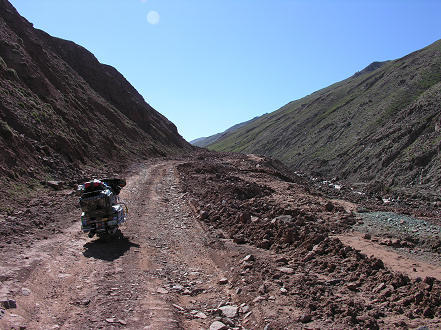 Opening at 9 am on my arrival, there was no passport stamp for me leaving
nor the Swiss bicyclist I met entering the country, very casual. The road
then disintegrated, a section totally removed by flooding, a creek crossing
now, a few landslides with truck tracks across the new rocky terrain before
reaching the almost 4300 metre border.
Opening at 9 am on my arrival, there was no passport stamp for me leaving
nor the Swiss bicyclist I met entering the country, very casual. The road
then disintegrated, a section totally removed by flooding, a creek crossing
now, a few landslides with truck tracks across the new rocky terrain before
reaching the almost 4300 metre border.
Move with me to Tajikistan
|
Story and photos copyright Peter and Kay Forwood, 1996-
|